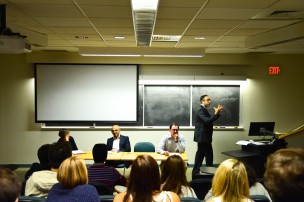
Last Thursday, Sept. 19, over 30 students and faculty members met in the Public Affairs Center to attend a panel discussion titled “Crisis in the Middle East.” The event was sponsored by the Allbritton Center for the Study of Public Life and the Government Department and was organized primarily by Professor of Government and Russian and Eastern European Studies Peter Rutland. The panel was designed to address recent developments in the Middle East, with a focus on Egypt’s involvement.
Members of the panel included Tarek Masoud, Associate Professor of Public Policy at Harvard University’s John F. Kennedy School of Government; Mohamed Elfayoumy, a former Consul and Political Officer with the Embassy of Egypt in Damascus and a Linda Vester Yale World Fellow; and Visiting Professor of Government Marcie Patton, whose research specializes in Turkish politics. The three began by giving opening statements and then responded to audience members’ questions. Professor Rutland mediated the discussion.
Masoud made the first opening statement, encouraging the audience to pay close attention to the events occurring in Egypt.
“It’s pretty easy to conclude that the democratic experience in that country is over,” Masoud said. “You might start thinking now that we have to write the obituary of Egyptian democracy. We have to identify the ‘cause of death.’ Why did Egypt’s brief experiment with democracy seem to have died?”
Masoud discussed Mohamed Morsi’s attempt to mix religion and politics in the government by deepening the role of conservative Sharia Law in Egypt’s new constitution that was passed in December 2012. Masoud also examined women’s roles in Egyptian society.
“Most people did not have a problem with the dialing back of women’s rights because that society is still highly patriarchal,” Masoud said. “If you ask Egyptians, for example, whether they believe that women should be president, they will have highly conservative views that align with those of the Muslim brotherhood.”
Elfayoumy’s statement followed, in which he traced the evolution of Syria’s current civil war. Currently, 40 percent of Syria is under regime control, while over one thousand rebel groups control 60 percent of the nation. There have been more than one hundred thousand deaths in Syria, and there are more than 10 million refugees and citizens in need of humanitarian aid.
“This crisis is shameful for all human citizens all over the world,” Elfayoumy said. “The number of people who have been killed in the Syrian crisis thus far is almost 30 times the number of people who died in 9/11. And the world is not moving a finger.”
Patton gave the last statement, detailing Turkey’s involvement in the current Middle East crisis. She argued that Turkey was the political model for the rest of the Middle East before the Arab Spring occurred.
“The catchphrase for Turkish policy pre-Spring was ‘Zero Problems With Neighbors,’” Patton said. “Now they call it ‘Zero Neighbors Without Problems.’”
Patton drew parallels between events in Egypt and those against Turkish Prime Minister Recep Tayyip Erdogan.
“Turkey has lost all of its credibility in the third world as a model to follow for democratic example,” Patton said.
During the question-and-answer portion of the lecture, one audience member asked whether the panelists considered the Middle East governable. Elfayoumy responded by explaining that countries are not drawn on the boundaries of cultural divides.
“The problem of democratization in the Middle East is extremely difficult to solve,” Elfayoumy said. “Colonial parents took the ruler and drew the map without thinking of what would happen in the future.”
Disagreement erupted on the panel when asked what action should be taken with regard to Syrian refugees. Elfayoumy argued that the United States should give more money in humanitarian aid than the $500 million that has already been given, which he claimed averages out to $40 per refugee. Masoud disagreed, stating that more U.S. intervention is not likely to end the conflict.
“If the U.S. were actually serious about alleviating the humanitarian crisis in Syria, we would have alleviated the humanitarian crisis [by now],” Masoud said. “The U.S. can’t get in there and know how to solve things, but we can set up policies that are sustainable.”
Though there was disagreement among the speakers, Rutland noted that he believed that the debate proved constructive. Rutland said that he was thrilled to have such esteemed panelists.
“You could see that what you learn about the region from reading the papers and from hearing it from experts in the field are totally different things,” Rutland said. “Events there are so complicated and moving too fast to make it into news reports…. Disagreement shows that these panelists are really grappling with these intricate problems.”
Hannah Norman ’16 expressed her satisfaction with the outcome of the discussion.
“I took away from the panel just how easy it is to overlook key factors of the conflicts in the Middle East,” Norman said. “Discussing the ongoing civil war, in addition to the different ethnic and religious factions, outside influences such as Saudia Arabia, Russia, and the U.S., among others, needed to be taken into account. The panel thoughtfully laid out the basics while simultaneously displaying different points of view. It was great.”
Students were excited to see the distinguished scholars on the panels present their cases and talk freely with each other.
“Every talk that I’ve been to outside of the regular curriculum has been invaluable—I have learned so much,” said Johnny Bebbington ’16. “I would really like to see more Wes students come to these talks and for them to get more exposure because we all have access to such incredible resources.”


Leave a Reply